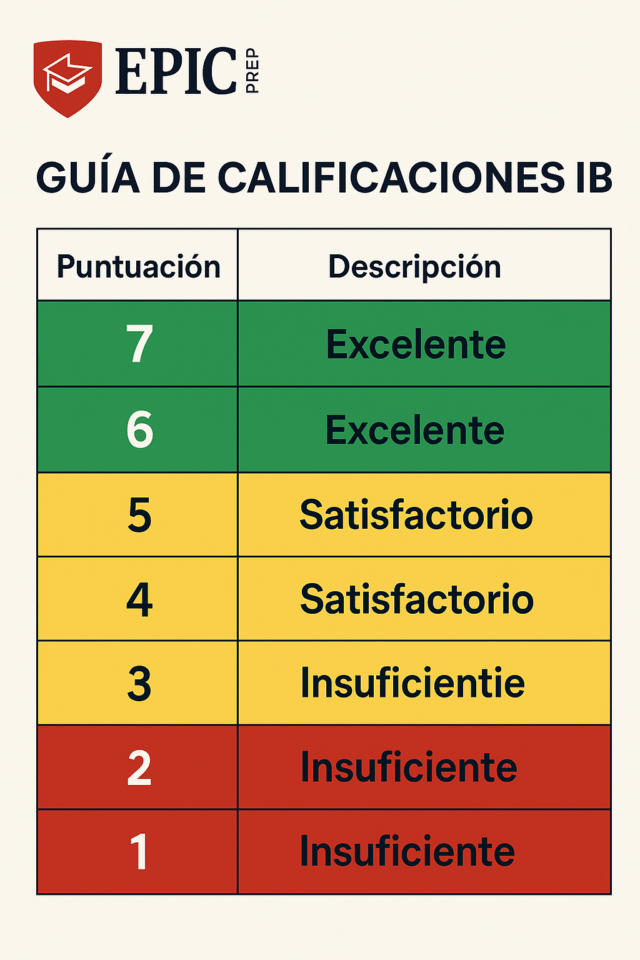What IB Scores Mean
IB scores can be enigmatic for many families: what does it really mean if a student scores a 5, 6 or 7?
The International Baccalaureate (IB) is one of the most rigorous and recognized educational programs in the world, and understanding these qualifications is essential to properly accompany your child’s learning process.
In this guide, we offer you a clear and straightforward explanation of what each number on the IB scale (1 to 7) represents and how to interpret those results as a family.
Table of Contents
IB Scale: how does it work?
The IB grades each subject with a score from 1 to 7, where:
- 7 is the highest rating (excellent)
- 1 is the lowest (very poor)
Students take six subjects and can obtain up to 42 points in total, plus 3 additional points for the combination of the Monograph, Theory of Knowledge (TOK) and CAS (Creativity, Activity and Service). So, the maximum possible within the IB scores is 45 points.
Practical example: A student obtains the following grades in his subjects: 6, 6, 5, 7, 6 and 5. This adds up to 35 points. Then, he gets 2 additional points for TOK and Monograph. His total score would be 37 out of 45which places it in a competitive range for many international universities.
These types of examples help families better visualize how scores are distributed and what margins there are for improving overall performance.
The IB grades each subject with a score from 1 to 7, where:
- 7 is the highest rating (excellent)
- 1 is the lowest (very poor)
Students take six subjects and can obtain up to 42 points in total, plus 3 additional points for the combination of the Monograph, Theory of Knowledge (TOK) and CAS (Creativity, Activity and Service). The maximum possible is 45 points.
What does each IB score mean?
Before breaking down each score, it is important to understand its practical impact: many universities use these scores as one of the main criteria for admission. A high score not only reflects academic excellence, but can open doors to scholarships, preferential access and dual degree programs. Therefore, correctly interpreting these numbers allows you to anticipate the level of opportunity a student will have in the college admissions process.
Below, we break down the meaning of each level to help you better understand the score reports:
7 – Excellent (outstanding level)
Demonstrates full mastery of subject matter, advanced critical thinking and complex application skills. Equated with honors grades.
6 – Very good
High academic performance with excellent understanding of concepts. There may be minor flaws or areas for improvement.
5 – Good
Good understanding of the subject matter. This type of score is common among students who have kept up with the pace of the course, but have not yet reached a high level of depth or analysis. They tend to be consistent learners, with good study habits, although they may lack advanced strategies for applying knowledge in complex contexts.
With the right support – such as one-on-one tutoring, guided drills or knowledge organization techniques – these students have a high potential to climb to level 6 or even 7. Identifying their weak areas and strengthening them with focus can make a significant difference in their final results. While there are areas for improvement, they show strength in key skills.
4 – Satisfactory
This is the minimum accepted by most universities. Indicates basic understanding, but lacks depth or consistency.
3 – Limited
Indicates difficulty in applying concepts and inconsistent performance. Risk of not obtaining the diploma if similar scores are repeated.
2 – Very limited
Very basic understanding, frequent errors. Needs significant improvement.
1 – Insufficient
Does not demonstrate understanding of the content. A rethinking of the study approach is needed.
Contact Us And Find Out Why We've Been Achieving The Best Results Since 2010
If you have unresolved questions, contact us and we will explain how we can help you achieve your goals.

What score is needed to pass the IB?
To obtain the IB diploma, the student needs:
- A minimum of 24 points in total in the 6 subjects.
*It is not mandatory, but it is recommended that at the top level (NS) min. 12 points and at the middle level (NM) min. 9 points.
- Not having more than two subjects with a grade of 1.
- Receive at least plus a grade of 2 in all subjects.
- Comply with the requirements of Monograph, TOK and CAS.
The most competitive universities usually require between 36 and 42 points, depending on the country and career.
How families can support academic achievement
Some recommendations:
- He regularly discusses his academic load and stress.
- Encourages effective and healthy study techniques, such as spaced review sessions, use of mind maps or visual summaries.
- Establish home study routines with fixed schedules, structured breaks and a space free of distractions.
- Accompany him or her in planning important deliverables such as the Monograph or TOK essays, using shared calendars or apps such as Trello.
- Consider outside support if there are subjects with scores below 5, as timely intervention can make a significant difference.
These actions not only reinforce learning, but help create a supportive emotional and organizational environment that is key to academic success.
Understanding IB scores allows you to spot areas where your child may need extra support. Some recommendations:
- He regularly discusses his academic load and stress.
- Promotes effective and healthy study techniques.
- Support him in time management, especially with TOK and the Monograph.

Testimonials of families who have already trusted us
“My daughter had an average of 4 in Math and with Epic Prep she went up to a 6 in just three months. The best thing was the human treatment and the constant motivation.”
– Ana R., mother of IB student in Madrid
“Julian wanted to raise his Chemistry grade from a 5 to a 7. At EPIC Prep, they designed a quick and personalized work plan for him that allowed him to improve significantly in both Chemistry and his SAT preparation. Thanks to his effort and the coaching he received, he was able to achieve his goals in both areas.”
– Sebastian K., father of IB student in Munich
These results are possible thanks to a proven methodology, adapted to the real needs of each IB student.
At Epic Prep we help IB students reach their full potential with personalized coaching, expert trainers and real-world simulations.
Conclusion:
Understanding IB scores goes beyond interpreting single numbers; it involves recognizing your child’s academic journey and the competencies that each range represents. Knowing that a 7 or 6 reflects excellent mastery of skills and content, while a 3, 4 or 5 denotes satisfactory performance with room for improvement, and a 1 or 2 points to areas that require urgent attention, gives you a complete picture of their progress.
With this clear, color-coded guide, you can quickly identify strengths and weaknesses, guide constructive conversations about study goals, and ultimately provide more effective support.
Armed with this information, you will be better prepared to accompany your child in their academic development, celebrate their achievements and make informed decisions about resources, tutoring or adjustments to their work plan.
We hope this article has answered your questions. If you have any questions regarding your IB preparation give us a call and we will be happy to explain how EPIC PREP can help you achieve your goals. On the other hand, if you prefer to continue reading, we leave you a link to our IB courses






